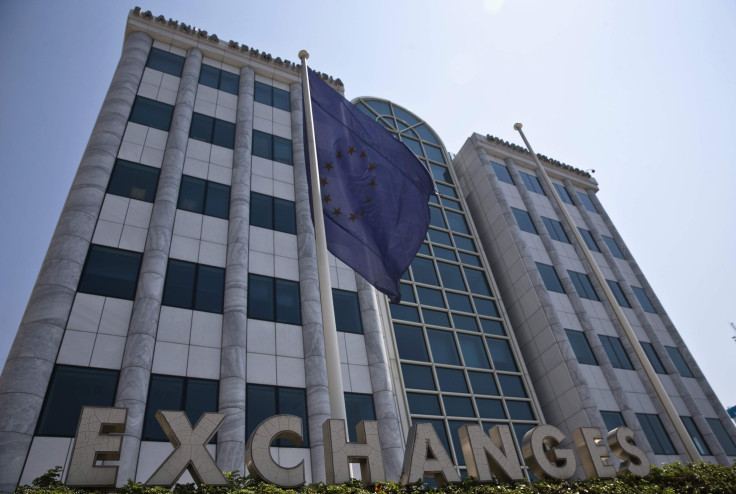Greek Stocks Brace For Plunge As Athens Stock Exchange To Reopen For First Time In A Month

Investors braced for a possible 20 percent plunge in stocks as the Athens Stock Exchange prepared to reopen Monday following a more than monthlong closure, the BBC reported, citing an asset manager at a Greek fund. The resumption in trading comes amid tense bailout negotiations that almost resulted in a "Grexit" from the 19-member eurozone.
Athens is seeking about 10 billion euros ($10.9 billion) to help prop up its banks, the Greek newspaper Avgi reported Sunday. The National Bank of Greece’s U.S.-listed shares have lost about 20 percent of their value while the Athens exchange has been closed.
Greece narrowly escaped an exit from the 19-member eurozone in July following months of uncertainty after the government and its international creditors struck a bailout “aGreekment” in a reform-for-aid deal for the debt-stricken country. The country was teetering on the verge of collapse with a hobbled economy and more than 300 billion euros ($330 billion) of debt, but it still faces several key steps before its most recent bailout deal can be finalized with international creditors.
The Greek government and Prime Minister Alexis Tsipras completed its abrupt about-face by accepting even more restrictive austerity terms from the rest of the eurozone last month after a Greek referendum July 5 rejected international creditors’ demands for austerity reforms. The move came after Greece defaulted on its International Monetary Fund repayment of 1.6 billion euros ($1.77 billion) at the end of June.
Greek banks reopened July 20 after being shuttered for three weeks, but capital controls that prevent Greeks from withdrawing large amounts of cash from banks have remained in place.
Recent reports suggest the Greek government had a secret "Plan B" to hack taxpayer accounts during crisis talks to prepare a return to the drachma, the currency Greece used before it adopted the euro in 2001, The Telegraph reported.
On July 16, the Eurogroup finance ministers pushed forward a new three-year aid package for Greece, worth 86 billion euros ($93.6 billion). The European Union finalized a 7.2 billion-euro ($7.8 billion) bridge loan to Greece to help keep the country afloat until the full three-year bailout is finalized.
But the Greek situation appeared to take another turn for the worse last week as tensions within the left-wing Syriza party mounted, the IMF refused to participate in the third bailout and economic sentiment nose-dived. The bailout could go ahead despite the challenges, but the deterioration in the economy will make it difficult for Greece to pass future reviews, said Jennifer McKeown, senior European economist at Capital Economics.
Athens faces more steps before a deal can be finalized with international creditors.
Greece has outstanding debts to the IMF and European Central Bank estimated at 12 billion euros ($13.2 billion) due by mid-August. In the meantime, Greece could push for long-term debt restructuring. The Eurogroup's summit statement touched on “possible” measures to keep Greece’s financing needs sustainable, but creditors have yet to fully elaborate.
“A debt write-off is absolutely necessary for the Greek economy to stand any chance of a full recovery and even the softer factions of the Syriza government are likely to consider the alternative of Grexit if there is no promise of imminent relief,” McKeown said in a research note.
The cash-strapped country is dealing with a debt that’s 177 percent of its gross domestic product, more than any of the 19 nations using the euro. The European Commission’s Economic Sentiment Indicator for Greece tumbled in July, showing the economy will likely contract 3.3 percent this year.
© Copyright IBTimes 2024. All rights reserved.





















